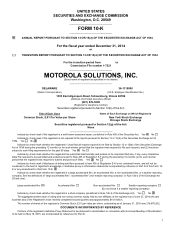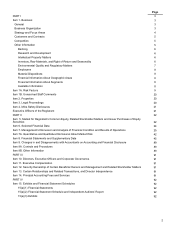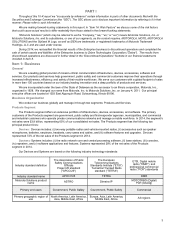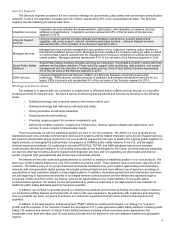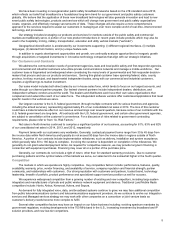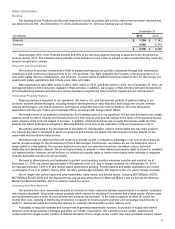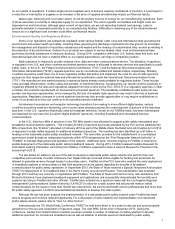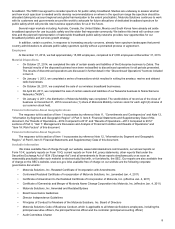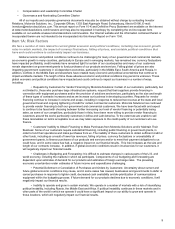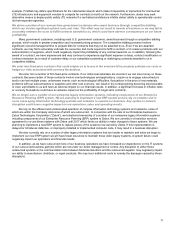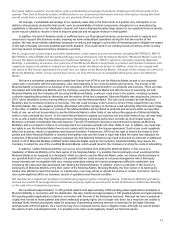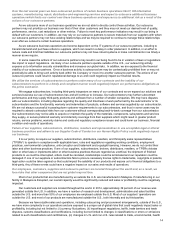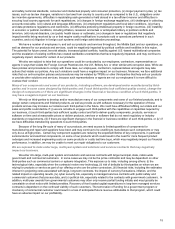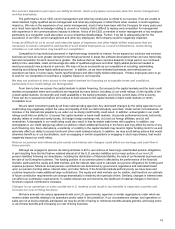Motorola 2014 Annual Report Download - page 13
Download and view the complete annual report
Please find page 13 of the 2014 Motorola annual report below. You can navigate through the pages in the report by either clicking on the pages listed below, or by using the keyword search tool below to find specific information within the annual report.11
example, FirstNet may define specifications for the nationwide network which make it impossible or impractical for commercial
LTE infrastructure and equipment vendors to compete for contracts to build out the network. Furthermore, states may seek
alternative means to deploy public safety LTE networks if a centralized architecture inhibits states' ability to operationally control
its first-responder agencies.
We derive a portion of our revenue from government customers who award business through competitive bidding
which can involve significant upfront costs and risks. This effort may not result in awards of business or we may fail to
accurately estimate the costs to fulfill contracts awarded to us, which could have adverse consequences on our future
profitability.
Many government customers, including most U.S. government customers, award business through a competitive bidding
process, which results in greater competition and increased pricing pressure. The competitive bidding process involves
significant cost and managerial time to prepare bids for contracts that may not be awarded to us. Even if we are awarded
contracts, we may fail to accurately estimate the resources and costs required to fulfill a contract, or to resolve problems with our
subcontractors or suppliers, which could negatively impact the profitability of any contract award to us. In addition, following the
award of a contract, we have experienced and may continue to experience significant expense or delay, contract modification or
contract rescission as a result of customer delay or our competitors protesting or challenging contracts awarded to us in
competitive bidding.
We enter into fixed-price contracts that could subject us to losses in the event we fail to properly estimate our costs or
hedge our risks associated with currency fluctuations.
We enter into a number of firm fixed-price contracts. If our initial cost estimates are incorrect, we can lose money on these
contracts. Because certain of these contracts involve new technologies and applications, require us to engage subcontractors
and/or can last multiple years, unforeseen events, such as technological difficulties, fluctuations in the price of raw materials,
problems with our subcontractors or suppliers and other cost overruns, can result in the contract pricing becoming less favorable
or even unprofitable to us and have an adverse impact on our financial results. In addition, a significant increase in inflation rates
or currency fluctuations could have an adverse impact on the profitability of longer-term contracts.
We no longer own a number of our enterprise legacy information systems, including components of our Enterprise
Resource Planning (ERP) system. We are planning to implement a new ERP system and we rely on complex and in
some cases aging information technology systems and networks to operate our business. Any system or network
disruption could have a negative impact on our operations, sales and operating results.
We rely on the efficient and uninterrupted operation of complex information technology systems and networks, some of
which are within the Company and some of which are outsourced. In connection with the sale of our Enterprise business to
Zebra Technologies Corporation (“Zebra”), we transferred ownership of a number of our enterprise legacy information systems
including components of our Enterprise Resource Planning (ERP) system to Zebra. We are currently in a transition services
agreement to co-use these systems with Zebra until 2017 which limits our ability to make changes to these systems. We are
planning to implement a new ERP system to replace pieces of the systems now owned by Zebra. If this implementation is
delayed or introduces defective, or improperly installed or implemented computer code, it may result in a business disruption.
We also currently rely on a number of older legacy information systems that are harder to maintain and when we begin to
implement our new ERP system we will have fewer resources to maintain these older legacy systems. A system failure could
negatively impact our operations and financial results.
In addition, as we have outsourced more of our business operations we have increased our dependence on the IT systems
of our outsourced business partners which are not under our direct management or control. Any disruption to either those
outsourced systems or the communication links between Motorola Solutions and the outsourced supplier, may negatively impact
our ability to manufacture, distribute, or repair products. We may incur additional costs to remedy the damages caused by these
disruptions.


